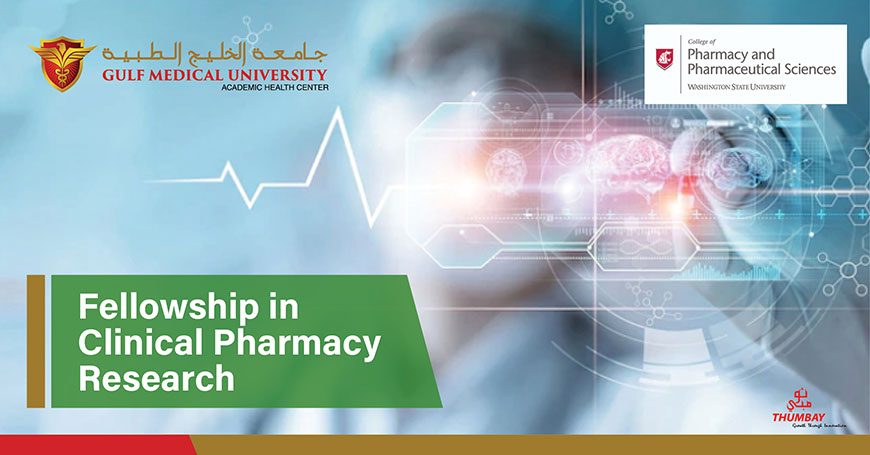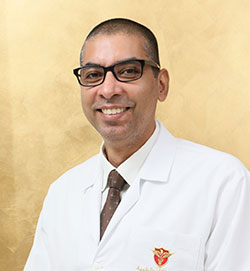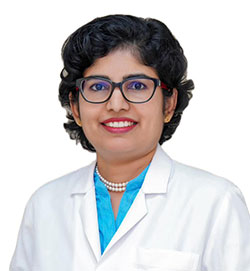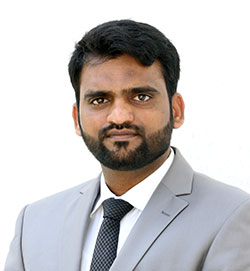The Fellowship in Clinical Pharmacy Research attracts experienced clinical pharmacists to perform solid research in the clinical area of their focus: infectious diseases, critical care, nephrology, or cardiology. Fellows are prepared to achieve the research expectations of a pharmacy faculty and clinical pharmacy practitioner at an academic health system.
Fellowship in Clinical Pharmacy Research

*Note: Two years full-time onsite program. No Scholarship or Stipend is provided. Contact Dr. Dixon Thomas for Admission inquiries: dr.dixon@gmu.ac.ae
- Doctor of Pharmacy (PharmD), Masters in Clinical Pharmacy, or PGY-1 Residency in Pharmacy Practice
- A licensed pharmacist in the UAE
- Hospital/Clinical practice experience of at least 1 year
- Three recommendation letters
- Latest Curriculum Vitae
- Pass the admission interview
The 2-year fellowship program includes advanced coursework and clinical pharmacy research involving research methods, biostatistics, health outcomes; training in setting up a clinical pharmacy service site for different disease management programs; planning, conducting and monitoring an outcomes-based project. The fellows spend most of their time in year 1 (1500 hours) and year 2 (1500 hours) on research. This constitutes 70% of their time commitment to the fellowship. The rest of the time is spent on precepting, teaching, and course work as required for the program.
Domain I. Practice and Research Orientation
- Discuss the principles of facilities and workflow design that support the delivery of specialized clinical pharmacy service.
- Participate in the creation of evidence required to establish a clinical pharmacy service practice
- Analyze financial, political, economic, and regulatory forces that affect the implementation of clinical pharmacy service and research.
- Contribute to activities that contribute to the hospital’s compliance with legal and regulatory requirements and performance standards (e.g., professional standards, statements and guidelines, laws regulating pharmacy practice, including infection control, patient privacy, and occupational health).
- Identify areas of improvement in clinical pharmacy practice through research.
- Lead committee agendas and informal work groups.
- Use methods in detail of clinical pharmacy research.
- Participate in ongoing research.
Domain II. Patient Care Services
- Assume responsibility for the drug therapy needs of patients.
- Establish collaborative therapeutic relationships between pharmacists and patients and/or caregivers.
- Build patient-specific information and drug information data sets needed to design and implement a comprehensive patient care plan.
- Solve/prevent patient-specific drug therapy problems.
- Define, in cooperation with the patient and their health care providers, individualized therapeutic goals that are measurable, achievable, and time specific.
- Develop a care plan that outlines the practitioner and patient’s responsibilities to meet defined goals of therapy.
- Provide ongoing evaluation of patient care.
- Appropriately document patient care.
- Establish a collaborative working relationship with healthcare providers in the healthcare setting.
Domain III. Teaching and Precepting
- Develop and deliver didactic lectures in areas relevant to Clinical Sciences
- Facilitate team discussions and case conferences with pharmacy students.
- Participate in Objective Structured Clinical Examination grading as possible.
- Develop and present educational programs to physicians, nurses, pharmacists.
- Serve as a role model and mentor for pharmacy students.
- Experiential precepting (of students in Bachelor’s, Master’s pharmacy or PharmD programs) at specified rotations.
- Develop and use a self-evaluation program designed to assess strengths and weaknesses and develop an action plan to address the areas of weakness.
Domain IV. Practice-Based Research Project
- Use effective project management skills.
- Participate in ongoing research projects.
- Develop a research protocol that seeks to enhance clinical pharmacy service.
- Collect quality data and perform appropriate statistical analysis with the help of a statistician.
- Prepare and submit the results of the research project for presentation at professional or scientific forums.
- Publish at least one paper in a Scopus indexed journal (even pilot research, but original research).
- Submit a major original research manuscript to a Scopus indexed journal with a minimum of 1 impact factor.
Meeting all Program Learning Outcomes (PLO) as determined by all members in the Panel of Experts (Program Director, Preceptor (if different than the program director), Medical Doctor, and an External Academician/Researcher) is required to complete the Fellowship. The achievement of PLOs are evaluated on a quarterly basis.
Dr. Dixon Thomas
BPharm, MPharm, MSc, PhD, MBA
Associate Dean Clinical
Associate Professor, Pharmacy Practice
Director, Fellowship in Clinical Pharmacy Research
Pharmacy Practice Department, College of Pharmacy
Gulf Medical University
Dr. Danial Baker
PharmD, FASHP, FASCP
Regents Professor, Pharmacotherapy
Director, the Drug Information Center
College of Pharmacy and Pharmaceutical Sciences
Washington State University
Dr. Diana Malaeb Matar
BScPharm, PharmD, MSc, BCPS, PhD
Assistant Professor, Pharmacy Practice
Pharmacy Practice Department, College of Pharmacy
Gulf Medical University
Dr. Terri Levien
PharmD, FWSPA
Professor, Pharmacotherapy
Director, Quality Assurance Improvement & Accreditation Preparation
College of Pharmacy and Pharmaceutical Sciences
Washington State University
Dr. Seeba Zachariah
Clinical Assistant Professor, Department of Pharmacy Practice
Dr. Dixon Thomas
Associate Dean Clinical
Associate Professor, Pharmacy Practice
Dr. Shabaz Mohiuddin Gulam
Lecturer, Department of Pharmacy Practice







